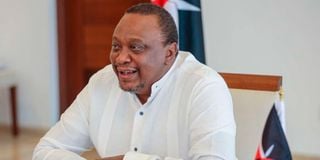Give Uhuru his due, it’s not that bad

President Uhuru Kenyatta during a virtual meeting with South African Minister for International Relations and Cooperation Ms Naledi Pandor.
What you need to know:
- I have seen very angry people who felt that our interview with the President was a complete failure because we didn’t push him and put him under pressure.
- My ideal interview, the one I like to watch and enjoy participating in is not the accusatory, rude shouting type.
In 2006, Hamas, the radical group, surprised many, including itself, by beating the Fatah party of Mahmoud Abbas and Yasser Arafat to win the Palestinian parliamentary elections. The two parties were similar in many ways: Fighting an angry conflict against Israel and representing the grievances of Palestinians.
But while Fatah had moderated its politics by renouncing violence and advocating a two-state settlement to the Middle East conflict, Hamas was still, by founding charter, committed to the destruction of Israel and carried out suicide attacks.
The governing Hamas, while far from a peace-loving party, was initially more moderated than the out of power version. Energy went more into politics and governing Gaza and less into suicide attacks. Of course with time Hamas went back to its old ways, but it proved that responsibility can cool even the hottest of heads.
Going into State House this week to interview President Kenyatta, I felt a lot like Hamas in the sense that age and responsibility have taken the edge off the radical instincts of my youth. In 1990, I was out in the streets, protesting and making trouble.
In 2000, I was still out in the streets, at least figuratively, but this time not just against the regime in Nairobi, but regimes elsewhere as well. Today, I find that I am a lot more interested in persuading people and negotiating interests than destroying the other side and rubbing my principles in its nose.
Against my best judgment and my best efforts, my capacity to annoy people, many times needlessly, still shocks even me. Recently at a very cordial meeting where I was moderating a short session, I asked an IEBC official: “Would you agree that Kenya is the safest place in the world to commit an election offence?”.
Presidential encounters
I believe it is, but my interlocutor couldn’t disagree more. I’m sure he did not see the point that the Press exists to hold public officials to account. And of course I don’t get any credit for holding my tongue as the commission struggled to explain its extravagance and total lack of imagination and the sheer insensitivity of asking for tens of billions of shillings at a time when millions are out of jobs and businesses have collapsed due to Covid-19.
Everyone expects journalists to always make the other guy sweat. After all, conflict and drama are the red meat of journalism, right? I have seen very angry people who felt that our interview with the President was a complete failure because we didn’t push him and put him under pressure.
First, my ideal interview, the one I like to watch and enjoy participating in is not the accusatory, rude shouting type. I’d prefer a calm, witty debate where the knives sink in soundlessly or are deftly parried aside.
Secondly, I have a very old-fashioned view about presidential encounters. My first editor, Mr Bernard Nderitu, was super-editor but never wrote. But when State House called wanting to give an interview, he picked up a note book and headed to talk to President Daniel arap Moi, came back and banged the only story to carry his byline in all the years I worked under him.
Editors, especially print editors, are not the best interviewers and will not get you the best story. But they are trusted to have the political judgment to know when to go for the story and to recognise the moment when the opportunity not to cause a scene should not be wasted, the story be damned.
This is the best argument for banning middle-aged editors from going anywhere near a presidential interview, but I digress.
Looting of parastatals
President Mwai Kibaki had many faults and we spent years reporting them. He was incompetent at managing the country’s politics and it almost resulted in a civil war.
He also had many strengths: tolerant to a fault and managed the economy with effortless experience. We spent years lambasting him for his many failures and took delight in his family dramas. We never made enough effort to recognise his strengths and contributions.
At funerals, we only speak good of the dead. As for our presidents, it is the opposite: we only see their sins. But we give the opposition a free pass, such is our love for the under-dog. I think it comes from 24 years of suffocating under Moi so anyone who raises a voice against the regime is a hero.
President Kenyatta should be held responsible for all the things that have happened on his watch: the looting of parastatals, the dams madness, the police killings, the disobedience of court orders, the debt and all the other things we chronicle on Twitter.
But I also believe that we should look at the other stuff his government has been doing and if we think he has done a good job in some areas, we should tell him so while he is still in office.
After the third encounter, I now believe that beneath the layers of power, great wealth and life-long privilege, somewhere in there, is a good man.
And that is the view of Hamas, right after seizing Gaza. As we say in my tribe, I have spoken my mind, now you can lynch me.





